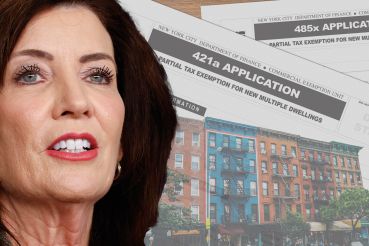Ms. Tighe is not so much the mastermind behind REBNY’s new strategy—that honor belongs to Mr. Spinola, REBNY’s president since 1986, who has been working for months on a new approach, and crafted a specific agenda together with Ms. Tighe. But her rise, and particularly her new interest in engagement, seems a reaction to a broader anxiety among many landlords and other real estate executives, who fear an onslaught of laws and regulations from a far more liberal and involved government at every level.
“In a lot of ways, we’re in uncharted territory with the federal, state and local governments, and the impact their actions have on our economy and our real estate market,” said Mr. Knakal, a member of REBNY’s executive board. “It’s very important for them to hear voices that should be heard.”
In terms of specifics, Ms. Tighe’s agenda calls for new incentive programs to create jobs; she has floated the concept of giving a tax credit for every new job created. The organization intends to take a stronger role in federal policy-most of its lobbying has typically been confined to Albany and City Hall-and REBNY recently retained a lobbying firm in Washington. And more broadly, Ms. Tighe wants the real estate industry to speak with a loud voice on civic issues and broader business policies, pushing for a better census count (more bodies counted means more federal dollars to the city); responsible city and state budgets; and immigration changes that allow for more educated workers to enter the country.
“We really very deliberately want to broaden our areas of focus beyond things that are strictly real-estate-related,” Ms. Tighe said.
This is not altruism—the real estate industry gains from these efforts. A stable city government and a better business climate brings more jobs and residents. More employment means lower office vacancy rates, which, in turn, means higher property values and higher office and apartment rents, and more commercial and residential leases.
AN EARLY EXAMPLE of this new strategy came last month: moving the trial of five accused 9/11 conspirators out of Lower Manhattan. It was not an issue that was a direct threat to a set of major landlords, but rather one that generally challenged downtown’s image and business climate.
Fearing the effects of an invasive security plan, the industry employed traditional lobbying behind the scenes, but also went public, launching a Web site, working in coordination with Community Board 1 and deploying executives to help lend voices against the trial. The end result helped spawn a rising chorus of voices in opposition to the trial downtown; Mayor Bloomberg flipped on the issue, urging a new location outside of the city; and now the Obama administration is looking for a different venue.
“It’s still important for the Real Estate Board to have the communication with key people and to do that in semi-private conversations,” Mr. Spinola said. “But we also then said, we’re ready to go public and force the issue, as we’re doing on the 41st Street Station.”
Of course, one wonders just how much can be changed with a strategy shift. As a group, wealthy landlords and real estate brokers do not tend to have the best image with the broader public, and an attempt to organize legions of brokers and lawyers probably would fail to have the same grass-roots feeling as a campaign by, say, aggrieved apartment tenants. This will likely be a challenge particularly for REBNY’s political effort, which is being set up, in part, to counter the rising influence of the labor-backed Working Families Party.
And there is also the question of whether it’s worth the uphill effort to expend energy pursuing many initiatives on REBNY’s agenda. The new stop on the No. 7 line is perhaps a prime example—cuts abound in government, making it a difficult time to ask for new subsidies for job creation and hundreds of millions for a new subway station. Thus far, industry leaders have been told a similar line by many a government official: no money here (although Senator Charles Schumer, a supporter of the station, has proposed a low-cost loan program).
Still, Ms. Tighe and Mr. Spinola say the push is worth the effort, and there are some potential green shoots. “I won’t say we should only be engaged with things that have certainty of success,” Ms. Tighe said. “What felt impossible maybe three months ago-we are beginning to feel the possibility.”
ebrown@observer.com


